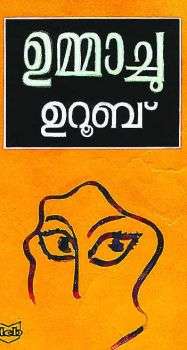Ummachu
 The cover of Ummachu | |
| Author | Uroob |
|---|---|
| Country | India |
| Language | Malayalam |
| Publisher | DC Books |
Publication date | 1954 |
| Pages |
264 (first edition) 199 (current edition) |
| ISBN | 81-7130-230-0 |
Ummachu (Beloved) is a Malayalam novel written by Uroob in 1954. Ummachu along with Sundarikalum Sundaranmarum are considered the best works by Uroob and are ranked among the finest novels in Malayalam.[1] In Ummachu, Uroob explores the ramifications of human relationships in a village.[2]
Theme
Ummachu is a saga of love and longing, loss and suffering. It narrates the ups and downs in the eventful life of a handful of characters.[1]
Plot summary
The novel begins with a depiction of the playful childhood of a naughty threesome - Ummachu, Mayan and Beeran. Ummachu, the charming daughter of Athar Ali, finds herself drawn to the strong and sturdy Mayan. But, ironically enough, she becomes Beeran's bride, much to her dislike. Ummachu confesses later: "What can I do, a hapless girl?" The novel covers two generations and signifies the dawn of the third. It also tracks the feud-ridden family tales, which are narrated by `historian' Ahammadunni. The focus is on `Ummachu.' The other protagonists who gain prominence are her close associates - Mayan, Beeran and Chappunni Nair. Assertive and impulsive, Chinnammu is said to be modelled on Ummachu; the mould may be the same, but each pursues a different path of her own.[1]
Film adaptation
In 1971, a film adaptation of the novel was released, starring Sheela as Ummachu, Madhu as Mayan, Nellikode Bhaskaran as Beeran, and directed by P. Bhaskaran. Uroob himself scripted the film.[3] Its music is scored by Raghunath with lyrics by P. Bhaskaran.
References
- 1 2 3 Sreevarahom Balakrishnan (15 April 2005). "`Ummachu' turns 50". The Hindu.
- ↑ Modern Indian literature, an anthology, Volume 2. 1992. p. 249. ISBN 81-7201-324-8.
- ↑ Ashish Rajadhyaksha and Paul Willemen (1999). Encyclopaedia of Indian cinema. Oxford University Press. p. 411. ISBN 0-85170-455-7.
External links
- Ummachu at the Internet Movie Database